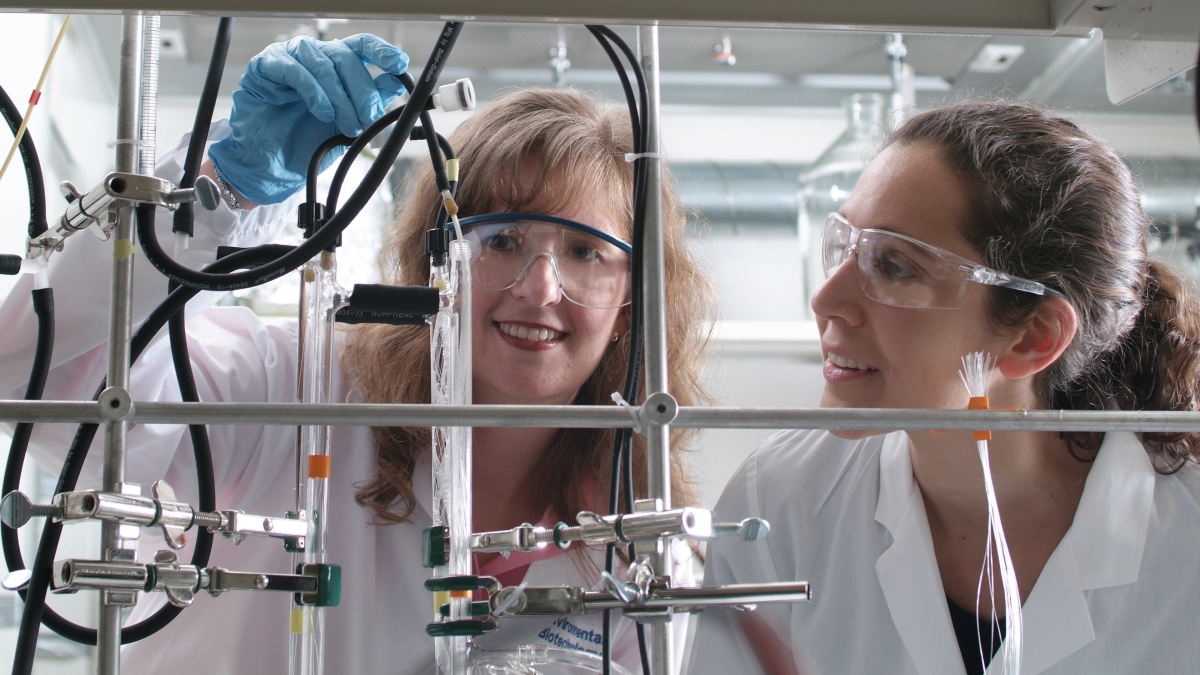Arizona universities play on one team for research

A healthy dose of competition exists among Arizona’s three public universities on the playing field. But in the lab, Arizona State University, University of Arizona and Northern Arizona University are putting rivalry aside to collaborate on three joint research projects. Each project includes investigators from all three universities, with topics that include digital research infrastructure, the relationship between gut microbes and autism, and environmental informatics.
The projects are funded by the Arizona Board of Regents Innovation Fund (RIF), a special program of the Technology and Research Initiative Fund (TRIF). TRIF monies come out of a 0.6 percent addition to the state sales tax that was approved by Arizona voters to support K-12 schools, community colleges and the state universities. TRIF is administered by the Arizona Board of Regents, which provides annual investments to each of the three universities to support strategic research.
This year, the state received more tax revenue than anticipated. As a result, the universities were invited to submit research proposals to receive up to $1 million in funding. Preference was given to proposals demonstrating collaboration across the universities. Two of the projects funded will also make it easier for the institutions to collaborate in the future.
“Finding solutions to grand challenges requires a transdisciplinary approach that not only engages researchers across ASU, but also leverages our external partnerships,” says Sethuraman Panchanathan, senior vice president of ASU’s Office of Knowledge Enterprise Development. “The Regent’s Innovation Fund presents an excellent opportunity to work with researchers across all three public Arizona universities.”
He continues: “I am excited by the potential of these projects to establish the framework and infrastructure, and to carry out the foundational research to position us to be competitive for winning large projects from external agencies.”
The following projects were funded through the Regents Innovation Fund:
Getting a handle on data
“LiveData: A Digital Research Infrastructure for Arizona’s 21st Century Universities” will pave the way for additional research collaborations by streamlining administrative compliance and providing a common platform for researchers from Arizona’s public universities to share and store data. The new infrastructure will expand support for research data with the goal of attracting additional funding.
LiveData will also offer a discovery portal that will allow Arizona citizens to easily discover research projects at all three universities. Commercial entities can also use the portal to identify potential partnerships.
ASU project leads include Philip Tarrant, director of information technology services for the Global Institute of Sustainability, and Phil Konomos, associate university librarian and chief technology officer.
Gut microbes and autism
What can we learn about autism from studying human gut microbes? A lot, according to Rosa Krajmalnik-Brown, associate professor in ASU’s School of Sustainable Engineering and the Built Environment, and her colleagues at UA and NAU.
Their project builds on recent studies that have suggested a role for gut microbes in Autism Spectrum Disorders, potentially arising from the role of the tiny organisms in modulating the immune system and gastrointestinal function. Children with Autism Spectrum Disorders commonly have gastrointestinal problems such as chronic constipation and/or diarrhea, which affect their quality of life and can worsen their behavior.
Recent work by Krajmalnik-Brown and others has shown that in children with Autism Spectrum Disorders, the gut microbiota has lower species diversity and lacks certain beneficial bacteria compared to neurotypical children. In the new study, researchers will compare the behavior, gastrointestinal symptoms and gut microbes of children with ASD before and after the use of probiotics. The scientists will also collect data from children with Autism Spectrum Disorders who do not take any probiotics.
A boost for environmental research
The Arizona Environmental Grid Infrastructure Service (AEGIS) supports the transition to informatics-intensive environmental research across all three universities. RIF funding supports the continued build-out of the system. The project leads include Rolf Halden, a professor in ASU’s School of Sustainable Engineering and the Built Environment and director of the Center for Environmental Security in the Biodesign Institute.
At full build-out, AEGIS will include geographic data, metadata, users and tools that are interactively connected in order to use spatial data in an efficient and flexible way. Hardware to support the system is already distributed across the three universities, and trained staff support AEGIS at each university. Several unique data sets will be added into AEGIS, allowing researchers across the universities to ask and answer novel questions through analysis within and across data sets. AEGIS will position ASU, UA and NAU to apply for large collaborative grants that require the host institution to have a data infrastructure system in place.
"The research expertise to be found at Arizona's three major state universities is amazingly complementary. This is also true of the perspectives forged from their different histories in growth and development,” says William Petuskey, associate vice president for Knowledge Enterprise Development at ASU. “This combination of intellectual strengths and problem-solving capabilities will be beneficial for the state, which is engaged in the highly competitive environment of the world economy."
Written by Kelsey Wharton, Office of Knowledge Enterprise Development
Media contact:
Amelia Huggins, amelia.huggins@asu.edu
Office of Knowledge Enterprise Development
(480) 965-1754